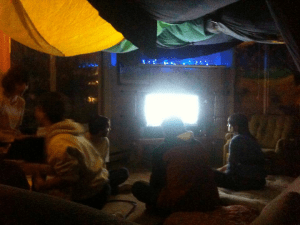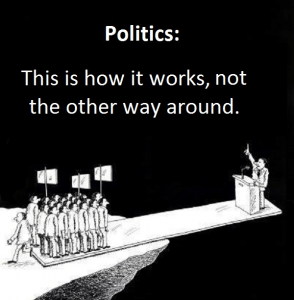Thanks to Lois for the question!
Generally, Anarchists are against voting. For a number of reasons:
On principle, it provides legitimacy to the government and the system.
Anarchists don’t believe there should be rulers who decide things for others. Representative democracies try to solve this by allowing the people to choose who makes the decisions. But voting is still choosing the rulers, it just feels nicer.
Participating in that system by voting provides it with legitimacy and approval. It allows those in government to say “See? The system works. The people are voting”.
Voting pacifies the people.
Voting gives people the illusion that the rulers are representing them, are working for them, or that the government is them (“A government of the people, by the people, and for the people”). When in reality it is clear that most politicians represent corporate “persons” more than their living, breathing constituents.
And for many people voting is the only legitimate way to engage in the system. And governments like it that way because it is a release valve for discontent: “Oh something is wrong? Don’t change the system, just change the people. It’s the [Republican’s, Democrat’s, Fill-in-the-blank-party-here] fault! Just vote for us!”
“For non-corporate human citizens there’s a ‘Democracy Theme Park’ where we can pull levers on voting machines and talk into microphones at hearings. But don’t worry, they’re not connected to anything and nobody’s listening except us”. – Jane Ann Morris
It doesn’t change much either way
Beyond the theory and the principle, I think the main reasons Anarchists don’t vote is because we don’t see it change much and we don’t see much of a difference between candidates.
When your politics are so different than the main parties, the candidates look more and more similar. Do you want the left wing or right wing of the Capitalist Party?
It’s like voting between two Republicans or two Democrats. Imagine choosing between McCain and Romney for President. Yes, you could find some differences. And I bet in a campaign they would seem huge and important. But really, the differences are small. So why spend a lot of energy choosing?
Alternate answer from A.K. Applegate:
Yes! And also no! Anarchists have historically had a variety of views about whether or not one should vote. Some say you might as well because it only takes five minutes and there’s at least a slight chance you will advance our goals of a world based on liberty, equality, ecology, and solidarity. Others say that voting means you’re consenting to this intolerable system and if you wish to maintain your moral integrity, you can’t take part willingly in the state’s legitimizing procedures at all.
The one point almost all anarchists agree on is that the state and the capitalist class will never let us vote away their power. Our dreams cannot fit in their ballot boxes and voting is, at best, only going to win small reforms; at worst, it siphons away energy and attention from efforts that can really change things: direct action and revolution. Emma Goldman said, “If voting did anything, they’d make it illegal.” Every two years we have a national election in the United States and things always seem to go the same way they’ve always gone, the elites do whatever they want and urgent reforms that solid majorities of the population want never materialize. It’s not that anarchists oppose democracy, far from it; it’s that we think the electoral “democracies” in the world aren’t real, and participating in them is a waste of time.
So what do you do on election day? Whatever the fuck you want, whatever you think will help and can still sleep at night after doing. The important thing is what you do every other day besides election day. Are you waiting for the next election, or are you getting people together to force change, whether the powers that be like it or not?
What do you think? Do you vote? Why or why not? Let us know in the comments!






